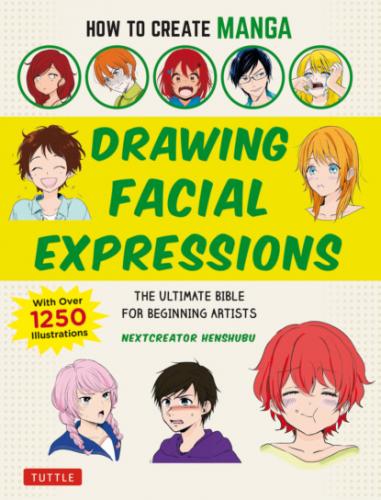How to Create Manga: Drawing Facial Expressions. NextCreator Henshubu
happens or something makes characters happy to the
point that they grin uncontrollably. It evokes a heart full
to the brim with emotion.
16
Expression Ideas
Scrapbook: Joy
17
Laughter
We all know the various scenarios where laughter breaks out, rippling through an
audience watching a funny movie or isolated in pockets among large gatherings of
friends. No matter what prompts it, all manga artists need to master drawing faces
twisted and contorted with joy.
One of the basics for conveying laughter is depicting an open mouth. The shape of the eyebrows
changes depending on the intensity of the laugh. The more enthusiastic the laughter, the lower
the ends of the brows get, resembling the brows on a troubled face. On a regular laughing face,
the brows are raised up, while on a kind laughing face, they form a gentle curve.
18
19
Variations
Stifling a laugh
These expressions indicate stifling laughter in situations that call for quiet or
where it would be rude to laugh. The brows and cheeks are taut from restraint
while the mouth loosens to form the expression of laughter. Adding a shaking
effect also works well to indicate the effort to stifle the laugh.
Laughter escaping
This expression shows what happens when laughter can no longer
be contained. Drawing the mouth slightly open evokes the image
of air—and laughter—escaping from tightly closed lips.
20
Suggestive laughter
This type of unconscious laughter emanates from
thoughts about one’s own (evil) schemes. Even when no
scheming is involved, a grin may be used as a bluff.
References: Plotting (Page 162)
DISCUSSION The Relationship Between a Character’s Personality and Expressions
Although “laughter” is a universal expression, it manifests
differently depending on the character’s personality. Energetic
characters laugh with their mouths wide open; subdued
characters laugh quietly without opening their mouths wide,
meaning that characters’ personalities can be conveyed via
their expressions. Furthermore, cool characters may laugh
using expressions other than that of traditional “laughter.”
21
Hearty Laughter
Hearty laughter spills out when someone is unable to control or contain her
amusement. Of all the expressions of joy, it’s the boldest or most obvious, and is
often used to express an exaggerated, uncontrollable reaction.
When depicting an outbreak of uncontrollable, hearty laughter, troubled brows play a key role.
This is laughter that can’t be restrained, and the more intense it gets, the more difficult it is to
draw breath, leading to the tautening of the brows so that they appear troubled. Adding tears
around the eyes increases the appearance of pain from laughing.
22
23
Variations
Crying from laughter
This expression depicts tears forming from laughing too hard, with
a smiling face as the base to which lowered brows are added. When
laughing to an extreme, the face uses different muscles from a typical
run-of-the-mill laugh, which can cause tears to form in the same way
as they may when yawning. Adding tears makes it easy to convey the
intensity of the character’s laughter.
DISCUSSION Using the Body to Express Emotion
Using not only the face but the whole body is effective for depicting expression. Build up your
understanding of this by watching situations in movies or TV shows where the actors are laughing.
The following examples show overreactions, where tears emphasize the magnitude of the laughter.
24
DISCUSSION The Difference Between Smiling and Laughing
Facial expressions can be created intentionally in order to communicate with others or appear
as the result of emotions welling up. Let’s look at the overall facial expression of smiling as an
example. This expression can be divided broadly into smiling and laughing.
A smile
A smile is a facial expression that one summons
to communicate a positive feeling to others,
showing that no harm is intended and that a
feeling of familiarity is desired. Even for those
who are not studying acting, a smile is a facial
expression that should be easy to conjure. In
the same way as using language, a smile is an
expression created in order to communicate with
others, made of one’s own volition.
A laugh
Have you ever laughed so hard that you became short of breath? It can get so bad that the muscles stiffen and cause
you to fall over. A laugh happens as a reaction to something amusing, such as watching a comedian or a skit. Within
the range of emotions and expressions, some can be controlled and others cannot. Sometimes it’s not possible to
control laughter. Keep these points in mind when drawing expressions.
25
Anger
Anger is a threat and an emotion that is directed at others. It is often emphasized by being depicted through
distortion or symbolic expression, in order to make the emotion easier to read.
Distorted expressions
When expressing anger, all the parts of the face
sink inward. The area between the brows becoming
strained and the outer corners of the eyes being
pulled up is one basic expression of anger.
Flow of expression
Slight annoyance creates little change
of expression. It could be said there is a
fine line between a resting face and an
expression of annoyance. When the face
